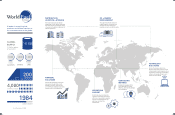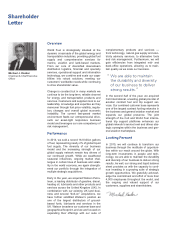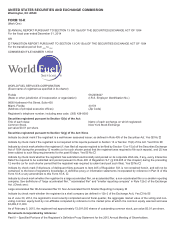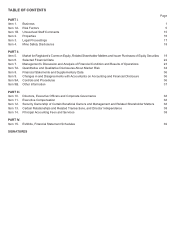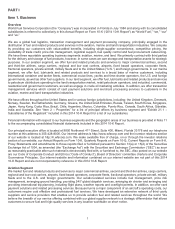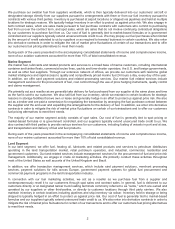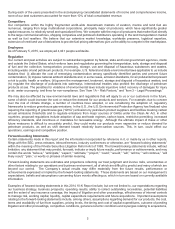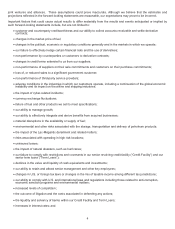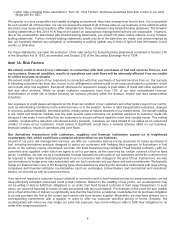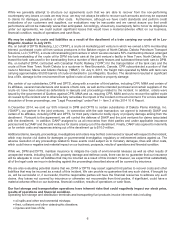World Fuel Services 2014 Annual Report Download - page 12
Download and view the complete annual report
Please find page 12 of the 2014 World Fuel Services annual report below. You can navigate through the pages in the report by either clicking on the pages listed below, or by using the keyword search tool below to find specific information within the annual report.7
• severe damage to and destruction of property and equipment; and
• loss of product and business interruption.
Damage arising from such occurrences may result in fines and significant third party claims. We maintain insurance to
mitigate these costs, but there can be no assurance that our insurance would be sufficient to cover the liabilities we might
suffer from the occurrence of one or more of the risks described above.
In addition, if we are involved in a spill, leak, fire or other accident involving hazardous substances or if there are releases
of fuel or fuel products we own or have custody of, our operations could be disrupted. We could also be subject to material
liabilities, such as the cost of investigating and remediating contaminated properties or claims by customers, employees or
others who may have been injured, or whose property may have been damaged. These liabilities, to the extent not covered
by insurance, could have a material adverse effect on our business, financial condition, results of operations and cash flows.
Some environmental laws impose strict liability, which means we could have liability without regard to whether we were
negligent or at fault. Any of these occurrences, and any resulting negative media coverage, could have a material adverse
effect on our stock price and on our business, financial condition, results of operations and cash flows.
Information technology failures and data security breaches, including as a result of cybersecurity attacks, could
negatively impact our results of operations and financial condition, subject us to increased operating costs, and
expose us to litigation.
We rely on our computer systems and network infrastructure across our operations. Despite our implementation of security
measures, all of our technology systems are vulnerable to damage, disability or failures due to physical theft, fire, power
loss, telecommunications failure, operational error, or other catastrophic events. Our technology systems are also subject
to cybersecurity attacks including malware, other malicious software, phishing email attacks, attempts to gain unauthorized
access to our data, the unauthorized release, corruption or loss of our data, loss or damage to our data delivery systems,
and other electronic security breaches. In addition to our own vulnerabilities, our reliance on email transmissions over public
networks to process certain transactions exposes us to risks associated with the failure of our customers, business partners
and other third parties to use appropriate controls to protect sensitive information, as well as to risks of on-line fraud and
email scams. Furthermore, despite our efforts to ensure the integrity of our systems and prevent future cybersecurity
attacks, it is possible that our business, financial and other systems could be compromised, especially because such attacks
can originate from a wide variety of sources including persons involved in organized crime or associated with external
service providers. Those parties may also attempt to fraudulently induce employees, customers or other users of our
systems to disclose sensitive information in order to gain access to our data or use electronic means to induce the company
to enter into fraudulent transactions. Past and future occurrences of such attacks could damage our reputation and our
ability to conduct our business, impact our credit and risk exposure decisions, cause us to lose customers or revenues,
subject us to litigation and require us to incur significant expense to address and remediate or otherwise resolve these
issues, which could have a material adverse effect on our business, financial condition, results of operations and cash flows.
We currently maintain insurance to protect against cybersecurity risks and incidents. However, there can be no assurance
that such insurance coverage will be available in the future on commercially reasonable terms or at commercially reasonable
rates. In addition, insurance coverage may be insufficient or may not cover certain of these cybersecurity risks and, even if
available, the insurance proceeds received for any loss or damage may be insufficient to cover our losses or liabilities
without materially adversely affecting our business, financial condition and results of operations.
The personal information that we collect may be vulnerable to breach, theft, loss or misuse that could increase
operational costs, result in regulatory penalties and adversely affect our results of operation and financial condition.
In connection with various businesses we operate, such as our transaction management and payment processing
businesses, we have access to sensitive, confidential or personal data or information from our employees, customers (both
corporate and individual consumers), suppliers and other third parties, some of which may be subject to privacy and security
laws, regulations and customer imposed controls. In the ordinary course of business, we collect, process, transmit and
retain sensitive information regarding these parties. Despite our efforts to protect this information, our facilities and systems
and those of our third party service providers may be vulnerable to security breaches, theft, misplaced or lost data and
programming and human errors that could potentially lead to such information being compromised.
Failure to adequately protect this information could lead to substantial fines, penalties, third party liability, remediation costs,
potential cancellation of existing contracts and inability to compete for future business. Due to legislative and regulatory
rules, we may be required to notify the owners of such information of any data breaches, which could harm our business
relationships, reputation and financial results, as well as subject us to litigation or actions by regulatory authorities.
Furthermore, there has been heightened legislative and regulatory focus on data security in the U.S. and abroad (particularly
in the European Union). Significant changes in applicable regulations may require us to make costly changes to our systems.


